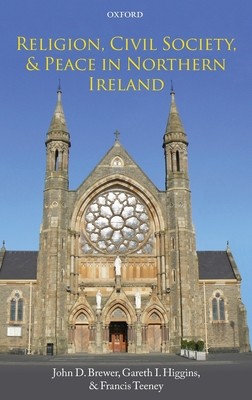
- We will send in 10–14 business days.
- Author: John D Brewer
- Publisher: Oxford University Press, USA
- Pages: 269
- ISBN-10: 0199694028
- ISBN-13: 9780199694020
- Format: 15.2 x 23.4 x 2.3 cm, kieti viršeliai
- Language: English
- SAVE -10% with code: EXTRA
Religion, Civil Society, and Peace in Northern Ireland (e-book) (used book) | bookbook.eu
Reviews
Description
Religion was thought to be part of the problem in Ireland and incapable of turning itself into part of the solution. Many commentators deny the churches a role in Northern Ireland's peace process or belittle it, focusing on the few well-known events of church involvement and the small number of high profile religious peacebuilders. This new study seeks to correct various misapprehensions about the role of the churches by pointing to their major achievements in both the social and political dimensions of the peace process, by small-scale, lesser-known religious peacebuilders as well as major players. The churches are not treated lightly or sentimentally and major weaknesses in their contribution are highlighted. The study challenges the view that ecumenism was the main religious driver of the peace process, focusing instead on the role of evangelicals, it warns against romanticising civil society, pointing to its regressive aspects and counter-productive activities, and queries
the relevance of the idea of 'spiritual capital' to understanding the role of the churches in post-conflict reconstruction, which the churches largely ignore.
EXTRA 10 % discount with code: EXTRA
The promotion ends in 21d.04:06:09
The discount code is valid when purchasing from 10 €. Discounts do not stack.
- Author: John D Brewer
- Publisher: Oxford University Press, USA
- Pages: 269
- ISBN-10: 0199694028
- ISBN-13: 9780199694020
- Format: 15.2 x 23.4 x 2.3 cm, kieti viršeliai
- Language: English English
Religion was thought to be part of the problem in Ireland and incapable of turning itself into part of the solution. Many commentators deny the churches a role in Northern Ireland's peace process or belittle it, focusing on the few well-known events of church involvement and the small number of high profile religious peacebuilders. This new study seeks to correct various misapprehensions about the role of the churches by pointing to their major achievements in both the social and political dimensions of the peace process, by small-scale, lesser-known religious peacebuilders as well as major players. The churches are not treated lightly or sentimentally and major weaknesses in their contribution are highlighted. The study challenges the view that ecumenism was the main religious driver of the peace process, focusing instead on the role of evangelicals, it warns against romanticising civil society, pointing to its regressive aspects and counter-productive activities, and queries
the relevance of the idea of 'spiritual capital' to understanding the role of the churches in post-conflict reconstruction, which the churches largely ignore.


Reviews